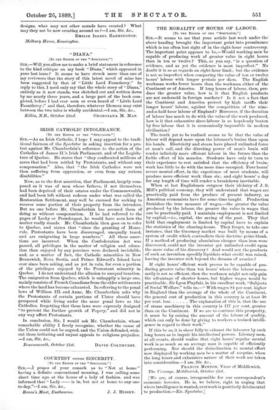THE MORALITY OF HOURS OF LABOUR.
[TO THE EDITOR OF THE "SPECTATOR."]
seems to me that your article last week under the above heading brought the important point into prominence which is too often lost sight of in the eight-hour controversy. The important point appears to be,—Would working men be capable of producing work of greater value in eight hours than in ten or twelve P This, as you say, " is a question of evidence, and as yet the evidence is most imperfect." No doubt it is so as regards an eight-hour limit ; but the evidence is not so imperfect when comparing the value of ten or twelve hours' labour with longer periods per diem. The English workman works fewer hours than the workman either of the Continent or of America. If long hours of labour, then, pro- duce the greater value, how is it that English products are not undersold in foreign markets ? Is it not a fact that the Continent and America protect by high tariffs their longer hours' labour, against the competition of the nine- and-a-half-hour labour of England ? Moreover, if the duration of labour has much to do with the value of the work produced, how is it that exhaustive slave-labour is so hopelessly beaten by free labour that it is economically impossible in modern civilisation ?
The truth yet to be realised seems to be that the value of labour will depend more upon the labourer's brains than upon his hands. Electricity and steam have placed unlimited force at man's call, and the directing power of man's brain will render infinitely more efficient labour in the future than the feeble effort of his muscles. Students have only to turn to their experience to rest satisfied that the efficiency of brain- work has little to do with the mere time occupied. Four hours' severe mental effort, in the experience of most students, will produce more efficient work than six; and eight hours' a day for any length of time will render a breakdown inevitable.
When at last Englishmen outgrow their idolatry of J. S. Mill's political economy, they will understand that wages are practically paid from the produce of present industry, as American economists have for some time taught. Production furnishes the true measure of wages,—the greater the value produced by the labour, the greater the value in wages that can be practically paid. I maintain employment is not limited by capital,—i.e., capital, the saving of the past. They that hold that employment is limited by capital have to explain the statistics of the clearing-house. They forget, to take one instance, that the Guernsey market was built by means of a, system of credit which contradicts their doctrine point-blank. If a method of producing aluminium cheaper than iron were discovered, could not the inventor get unlimited credit upon the mere value of his discovery ? And would not the products of such an invention speedily liquidate what credit was raised, leaving the inventor rich beyond the dreams of avarice ?
If eight hours' efficient work proves to be capable of pro-
ducing greater value than ten hours' where the labour neces- sarily is not so efficient, then the workmen might not only gain the advantage of shorter hours, but higher wages would be practicable. Sir Lyon Playfair, in his excellent work, "Subjects of Social Welfare," tells us,—" With wages 84 per cent. higher in England than the average of the whole of the Continent,
the general cost of production in this country is at least 30 per cent. less The explanation of this is, that the use of steam machinery in this country is 117 per cent. greater than on the Continent. If we are to continue this prosperity, it must be by raising the amount of the labour of quality, which can only be done by giving to workers a trained intelli- gence in regard to their work."
If this be so, it is sheer folly to exhaust the labourer by such long hours as to impair his intellectual powers. Literary men, at all events, should realise that eight hours' regular mental work is as much as an average man is capable of efficiently performing. Nor should the disinclination to mental effort now displayed by working men be a matter of surprise, when the long hours and exhaustive nature of their work are taken into consideration.—I am, Sir, &c., FRANCIS MINTON, Vicar of Middlewich.
The Vicarage, Middlewich, October 21st.
[We are, of course, irresponsible for our correspondent's economic heresies. He is, we believe, right in urging that where intelligence is wanted, overwork is positively detrimental to production.—En. Spectator.]






































 Previous page
Previous page